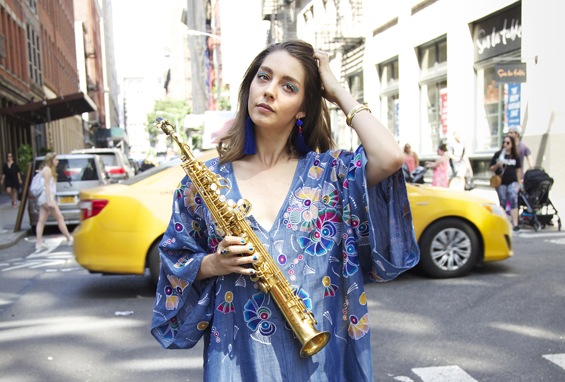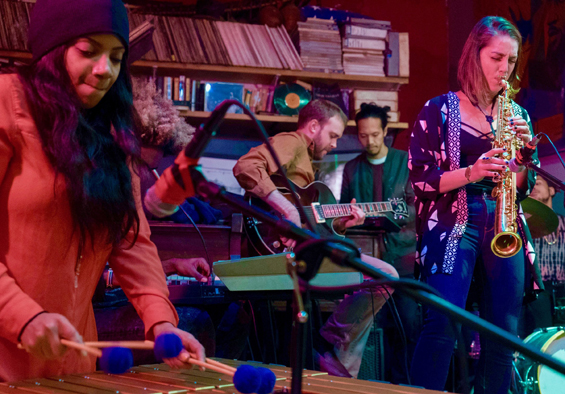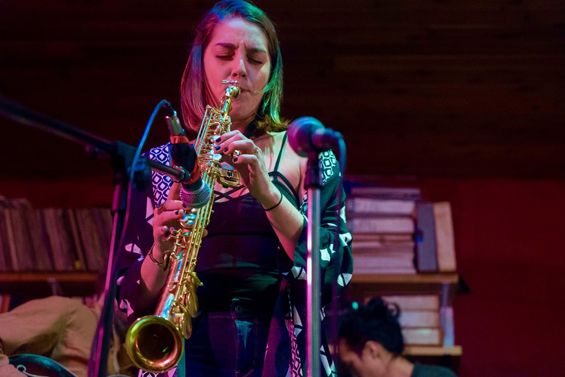

FIVE QUESTIONS WITH HAILEY NISWANGER
Saxophonist Hailey Niswanger (pronounced ‘NICE-wonger') wasted no time getting her career started: her self-produced and self-released debut album, Confeddie, came out in 2009 during her first year in the Jazz Performance program at Boston's Berklee College of Music. The Houston-born and now Brooklyn-based wunderkind followed that auspicious debut three years later with The Keeper and in 2015 with PDX Soul. Among those with whom she's played are Esperanza Spalding, Demi Lovato (on Saturday Night Live), Ralph Peterson, and Terri Lyne Carrington, and Niswanger, proficient on alto and soprano saxes, is also a member of Wolff & Clark Expedition, an outfit fronted by pianist Michael Wolff and drummer Mike Clark. She's now branching out with MAE.SUN, a sextet project whose debut album, Vol. 1: Inter-be, has just been released (and is reviewed here). Drawing for inspiration from the writings of Thich Nhat Hanh, the release sees Niswanger playing soprano alongside a band of gifted players well-primed to bring the music's heady blend of jazz, funk, and soul to life. textura spoke with her recently about the new group and album and the talented personnel with whom she's working.
1. Both the MAE.SUN group concept and Vol. 1: Inter-be album are infused with philosophical notions about universal harmony and the connectedness of all things. Is there anything in particular that brought about this raising of consciousness and more philosophical mindset? What's the explanation, by the way, for the MAE.SUN name and Inter-be concept?
The group MAE.SUN and Vol. 1:Inter-be were largely inspired by the teachings of Vietnamese Buddhist monk, Thich Nhat Hanh. I found his book, Peace Is Every Step, and it changed my life. He made me conscious of the interdependent nature of reality, the beauty in the present moment, to let go of concepts, and to appreciate all the many miracles that surround us. I felt my compassion growing and the compassion growing in my music as well.
MAE.SUN aims to not only bring awareness of our connection, but to feel it. Thich Nhat Hanh says, “The verb ‘to be' does not express the dynamic living state of the universe.” We can't just be, for there are so many elements we need in order to survive. We coexist and ‘Inter-be' with everything. Here on this planet, without the sun, nothing can ‘be.' So the sun is our second heart, one that we all share and connects us all. The band name was formed by combining our communal heart, the ‘Sun', with my middle name ‘Mae.'

2. Vol. 1: Inter-be stylistically transcends easy genre pigeonholing, even if elements of jazz, funk, soul, balladry, and rock are present. It thus comes across as a quasi-manifesto of sorts, even if one implicitly asserted, for a new approach that defies genre categorization. Are MAE.SUN and Vol. 1: Inter-be for you embodiments of a new way of thinking about music, and do you see them also collectively acting as a proposed model for exploring genre-free musical ideas?
MAE.SUN and Vol.1: Inter-be have definitely embodied a new way of thinking about music for me; I've never felt so free and honest with my music. When I first started composing for MAE.SUN, I released the notion of concepts and the idea of fitting into a genre. I opened myself up to all the many different musical influences around me and meditated on our interconnectedness while channeling vibrations of love and peace, and the music of MAE.SUN found me. This music felt so natural to write and led me to a freedom I had never felt.
The music comes together as volumes, a continuous piece of music, where when we perform, we don't stop. The story line and intentions have been written, but the music deeply explores improvisation, so each time we play, we're taken on a different journey. I do hope the music inspires a new genre-free way of thinking and influences others to pull from a mixed palette of inspiration.3. Aside from the fact that Vol. 1: Inter-be is credited to MAE.SUN and the others to you specifically, in what ways does the new release differ from the previous ones, Confeddie (2009), The Keeper (2012), and PDX Soul (2015), and in what ways does it advance on what you were doing in those earlier releases? And why exactly did you decide to issue Vol. 1: Inter-be under the MAE.SUN name and not your own?
I was consumed by jazz in high school and college. Confeddie, which came out during my freshman year at Berklee, and The Keeper, which I released just after graduating, are jazz albums that feature original compositions and arrangements of compositions by my favourite jazz masters. PDX Soul showcased a funk/soul jazz sound and a large ensemble. While all these projects were representative of me at those times, I felt like I had yet to find the sound that was truly my purpose and where I felt the most free.
In creating MAE.SUN, I let go of boxes and found a deeper meditation in my music. This project comes from an expansion of influences, and I finally feel like I've found my own sound, one rooted in universal harmony. I chose to go by a moniker for this project not only because I feel that I'm on a new path musically but because I also still intend to release albums that are classified as jazz and funk and perform as Hailey Niswanger Quartet and PDX Soul.
4. Could you tell us a little bit about the band itself and its members, what the individual players bring to MAE.SUN, and how you managed to put such an incredible band together? In what ways does being based in Brooklyn inform your music, and do you have a plan in place for when the second volume will be released?
MAE.SUN features Nikara Warren on vibraphone, who's participated in the Betty Carter Jazz Ahead program, shared the stage with her grandfather Kenny Barron, vocalist Charenee Wade, and Jeff ‘Tain' Watts, and who also composes and leads her own group. Axel Laugart plays keys; he released his self-titled album in 2016, is a founding member of the band (U)nity, and has performed with the Afro Cuban All Stars, George Clinton, and Pedrito Martinez. On guitar is Andrew Renfroe, who has performed with Carmen Lundy, Terrace Martin, and Nat Reeves. Aaron Liao on synth and electric bass has performed with Patrice Rushen, Valerie Simpson, Terrence Blanchard, and is a member of alternative experimental pop group Iris Lune. Drummer David Frazier Jr. actively performs with Gabriel Garzón-Montano and SZA.
I completely trust these musicians and invite them to interpret the story lines I've written however they choose. It brings excitement to the music, knowing we'll experience something entirely unique each time we perform. All of the members in MAE.SUN, aside from Aaron whom I met at Berklee, are musicians that I met upon moving to Brooklyn. New York has opened me up to a whole new musical experience, and I'm grateful for the creative spark that ignites this city. I plan to record volume two in March and have it released in the fall of 2018.

5. How has your saxophone playing changed since you started playing professionally and over the four albums? And are there any particular saxophonists (and non-saxophonists) who've influenced and inspired you?
My playing has grown and changed over the four albums. I've reached a new level of comfort when improvising. I'm able to relax and not overthink, and I've strengthened my tone. It's also been exciting to explore different horns and find a unique voice on each of them. Whereas my first album was solely alto saxophone, which was the primary instrument choice for the following two albums, MAE.SUN is exclusively performed on soprano saxophone (for now anyway), and I've also been playing tenor for my new Quartet music.
My main saxophone influences include John Coltrane, Wayne Shorter, Cannonball Adderley, and Joe Henderson. Some non-saxophone inspirations are Herbie Hancock, Alice Coltrane, Miles Davis, George Duke, Hiatus Kaiyote, Moonchild, and Erykah Badu, but really there are too many to list.November 2017![]()